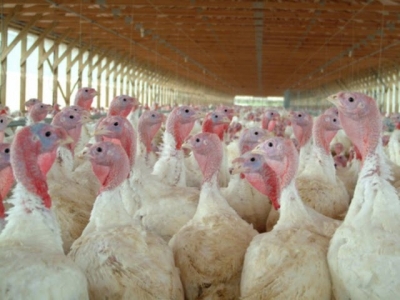Extra vitamin D may protect poultry during a coccidial challenge

Supplemental vitamin D may mitigate the negative effects of coccidial infection in turkeys by boosting weight gain, say researchers from the Ohio Agriculture Research and Development Center.
The group sought to improve the immune reaction in young turkeys using 25-OH cholecalciferol (25(OH) D), a form of vitamin D as an additive in their feed, they said.
“We identified that supplementing turkey poults (as well as broiler chickens) with 110 ug/Kg of feed of 25-OH cholecalciferol [25(OH) D] improved body weight gain and decreased coccidial oocyst shedding,” said the team.
As part of a disease management system, the treatment also offers a solution that doesn’t include the use of an antibiotic, they said. And it has produced similar results in broiler chickens. “We have identified the ideal dose of 25-OH cholecalciferol that will improve host protection during a coccidial challenge and allow less reliance on anticoccidial compounds,” said the US researchers.
Answers sought
Turkeys, broiler hens and other types of poultry can see negative effects from coccidial infections, said researchers. These include increased mortality rates and high economic losses for producers.
But the group’s previous research demonstrated that supplemental vitamin D could improve the immune responses of layers facing infection, they said.
“Results indicate that 25(OH) D supplementation has the potential to enhance poultry industry productivity without burdening it with new expensive protocols,” they said. “Our novel approach can constructively transform or complement the current agricultural industry approaches for controlling coccidial infections in turkeys.”
Experiment details
In the experiment, 200 day old turkey poults were divided into one of four treatment groups and each treatment was replicated in ten cages containing five birds, said the scientists.
The groups received a basal diet with one of four levels of additive vitamin D, they said. Birds received either 27.5, 55, 82.5 or 110 ug/kg of the additive, which is equivalent to 1100, 2200, 3300 or 4400 IU of cholecalciferol.
The poults were fed for 21 days and then weighed, five groups per treatment level were then selected and challenged with live coccidial oocysts to provoke an infection, they said.
Poults were weighed on the day of the challenge and six days after the challenge to determine the difference in bodyweight percentage, researchers said. Birds were also weighed on days 5 and 12 post challenge.
Fecal samples were collected on day 5 and day 12 post challenge and cecal tonsils were collected from selected poults on both days to establish the percentage of CD4+ and CD8+ cells, they said.
Results
Higher levels of supplemental 25(OH) D produced better results in the turkey poults, said researchers. It boosted weight gain and damped the amount of oocyst shedding.
They found that turkey poults supplemented with 55 ug/kg or higher doses of 25(OH) D had decreased fecal oocyst shedding compared to the group fed 27.5 ug/kg 25(OH) D and challenged with coccidia.
They noted that those fed 110 ug/kg 25(OH) D had increased body weight gain over a 12-day period following coccidial infection compared to the group fed 27.5 ug/kg 25(OH) D and challenged with coccidia.
“We concluded that it might be beneficial to supplement turkey poults with high doses of 25(OH) D during a coccidial infection,” said the Ohio based team.
They said that supplementing 25 (OH) D during inflammatory stimuli most likely increased the local production of active Vitamin D3 in extra-renal organs like liver and induction of T regulatory cells. “This might be a plausible explanation for the decreased production of inflammatory cytokines seen in liver.”
The researchers said as increased levels of inflammatory cytokines will lead to a more systemic effect in birds manifested by anorexia, suppression of inflammatory cytokines in these birds might contribute to normal appetite and body weight gain.
The research project was funded by the US Poultry and Egg Association and has been named the Virgil H Cooper Turkey Fund 2014 award.
Related news
 Egg-based delivery may improve young animal health & nutrition, say researchers
Egg-based delivery may improve young animal health & nutrition, say researchers An egg-based antibiotic-free additive may prevent coccidiosis and boost the health of young chickens and calves, says a group of researchers at the University
 Phytase supplements may improve eggs in heat stressed layers
Phytase supplements may improve eggs in heat stressed layers Hens raised in conditions generating heat stress may lay better eggs if their diet includes supplemental phytase, even if diet quality is poor
 Facial recognition, robotics to aid chick vaccination
Facial recognition, robotics to aid chick vaccination FFAR awards $800,000 grant to start-up company using facial recognition and robotics to revolutionize vaccination for chicks.